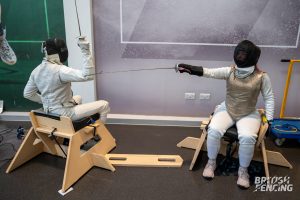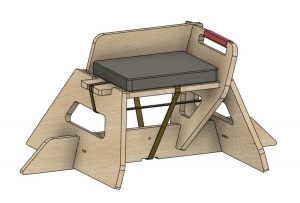

Expressions of interest are now open for those keen to introduce the SwordSeat™ to their club, school, or activity centre!

We are delighted to launch our online platform for the brand new SwordSeat™. It is a flat-packable, easy-to-store, and significantly cheaper alternative to metal frames and fencing wheelchairs, enabling clubs and providers to more readily support disabled and injured fencers who need to sit down to participate and do so comfortably.
Designed by engineers at the University of Bath in collaboration with British Fencing, and funded through generous donations from the BF Charity, the SwordSeat is a pair of chairs that correctly position competitors for combat. The simple six-piece slot-together design means that it can be purchased fully printed at an estimated cost of around £400, or constructed by potential participants of the sport and local clubs for around £150 worth of plywood.

Express your interest in the SwordSeat by filling out the form below:
An official launch event is planned to take place at the University of Bath’s world-class Sports Training Village in January 2025.
Only a handful of the UK’s 400+ fencing clubs have wheelchair fencing rigs, which cost more than £5,000 and need to have wheelchairs attached, totalling over £15,000. This leaves aspiring competitors facing significant barriers to trying the sport, so the SwordSeat has been created to offer a low-cost alternative.
The SwordSeat is the creation of Dr Ed Elias, a Senior Lecturer in the University’s Department of Mechanical Engineering, and his Integrated Design Engineering student Conor Roberts. Dr Elias said:
“The SwordSeat is our response to the prohibitive cost and equipment requirements of wheelchair fencing. What’s surprising to many is that wheelchair fencers don’t need to move their chair when fencing – instead they are fixed into position. By removing these complicated elements and simplifying our design to the essentials, we’ve created a seat that is cheap and easy to build but meets the needs of anyone hoping to start out in the sport.”

BF Inclusion Officer (Disability) Rick Rodgers, who initiated the project, added:
“The SwordSeat is a game changer. It’s really going to open up the grassroots and give us a much larger pool of participants to enjoy this incredible activity and potentially become future Paralympic athletes.
“Reducing the equipment cost by more than 90% makes it roughly the price of a fencing mask or jacket: things that clubs loan to new fencers. It’ll save participants who need to fence sitting down from spending thousands of pounds on a new wheelchair before they even know if they like the sport.
“The SwordSeat means that BF now has an end-to-end offer for people looking to try the sport, with support from the grassroots up to elite level. We hope to see a pair of SwordSeats not only in every club in the country, but also being used in schools and a range of places where getting access to the wheelchairs and equipment has until now been impossible due to the price tag.”
For more information, visit our dedicated SwordSeat webpages.
For more information on wheelchair fencing, please visit our Disability Inclusion Zone.
Don’t miss the latest news. Subscribe to our weekly summary email, The Fencing Digest, including the previous week’s latest news and announcements. Sign up here.
